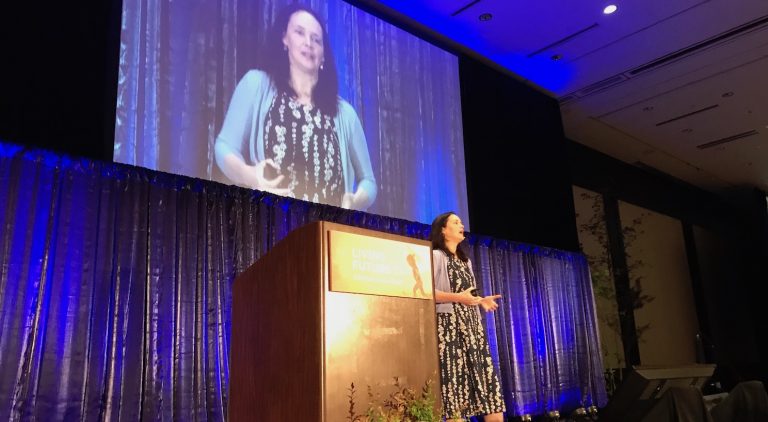International Living Future Institute CEO Amanda Sturgeon announced a slew of news this morning at the Living Future unConference in Seattle. Among the highlights:
- The ILFI Zero Energy certification program now allows an exception for certain buildings to rely partly on offsite renewable energy. It’s the most significant of several changes adopted this year that give ZE certification more flexibility. Previously, ZE projects were allowed only to counttoward a net zero energy goal renewable energy generated onsite. Sturgeon was careful to note that the change is structured to ensure that the exception doesn’t provide a way for projects simply to gain certification by purchasing clean energy offsets.
- ILFI is collaborating with the Portland, Ore., based New Buildings Institute on a “zero energy portal” where building project leaders will find a guidance to net zero energy, as well as a toolkit for ZE certification (see press release below).
- Total ILFI certifications have jumped up to 73, including 15 full LBC buildings. There were fewer than 50 total certifications as recently as last fall. In addition, 385 projects are registered for future certification.
- The most recently fully LBC certified building is in New Zealand. It’s Te Kura Whare, a community center for the indigenous Tuhoe people.
- Two more manufactured products have earned the Living Product Challenge label, in addition to the six that already have it. The names of those products will be announced tonight.
- ILFI is adding a new “Handprint” label to its suite of disclosure programs. But this label — now in a pilot phase — will be different in that it “will enable products to be transparent about the good they’re doing in the world.”
- Microsoft Corp. has registered its 640,000-square foot Silicon Valley campus for petals certification, “with a goal to focus on the water petal and to see how far they could get with the Living Building Challenge.”
- ILFI’s Biophilic Design Initiative is launching the Stephen R. Kellert Design Award, honoring the late Yale University social ecologist, who contributed greatly to the development of biophilic design. Sturgeon said the awards process “will open on June 1.”
We’ll bring you more details on the Living Future unConference over the next couple of days.
UPDATE: Here’s a press release from ILFI and NBI on their zero energy collaboration:
The International Living Future Institute (ILFI) and New Buildings Institute (NBI) today announced a partnership that will streamline and strengthen the tracking and certification of zero energy (ZE) buildings in order to drive broader market adoption, codification and standardization of ZE technologies in everyday buildings.
“NBI and ILFI are aligned in our shared vision for a future where high performance, ultra-low energy buildings powered by renewable energy are the norm, not the exception,” said Amanda Sturgeon, CEO of ILFI. “Through each of our programs, we have demonstrated time and again that zero energy is achievable and scalable. Together, we can catalyze this movement.”
As a first step, NBI and ILFI will consolidate certified, verified and emerging ZE building projects into a single, unified dataset with common categories. In addition, NBI and ILFI will also share a protocol for data collection, certification and case studies. The partnership builds on the strengths of each organization, and the end result will be one seamless system for tracking, registering, certifying, and evaluating the burgeoning zero energy movement. The buildings industry—design teams, builders, owners, operators and others—will also get the needed clarity on the standards for zero energy performance using data driven outcomes for validation.
Within this collaboration, the ILFI will continue as administrator of the Zero Energy Building Certification, while NBI will act as lead certification auditor as well as administrator of the building data. In addition, projects currently pursuing the Living Building Challenge will be added to the emerging ZE set, creating a broad cohort of leading edge projects worldwide.
“We have the opportunity to reimagine and remake the built environment by 2050,” said Ralph DiNola, CEO of NBI. “Zero energy buildings offer a pathway to that future. Today, nearly half of U.S. energy and 75% of electricity is consumed by buildings. By combining our efforts, we can dramatically reduce carbon emissions and provide deeper insight into what it takes to get to ZE and in doing so, we will rapidly grow the number of buildings striving for zero energy.”
Over the next several months, ILFI and NBI will work to further integrate the way they accept project data and communicate about the new certification and database protocols. Tracking and spotlighting success and lessons learned remains a key goal for both partners in order to fuel continued growth of projects in the residential, multifamily and commercial sectors.


